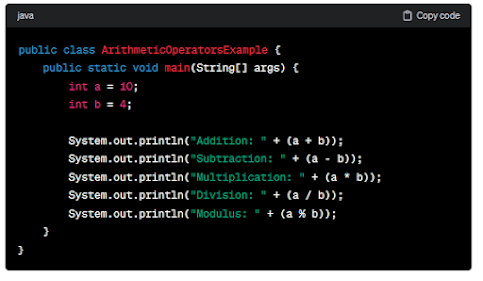Java, one of the most widely used programming languages, provides a rich set of operators that allow developers to manipulate variables and perform various operations. Understanding these operators is crucial for writing efficient and effective Java code. In this article, we'll explore the different types of operators in Java with examples to illustrate their usage.
- Arithmetic Operators:
Arithmetic operators are used to perform mathematical
operations on numeric values. The basic arithmetic operators in Java include
addition (+), subtraction (-), multiplication (*), division (/), and modulus
(%).
- + (Addition): Adds two operands.
- - (Subtraction): Subtracts the
right operand from the left operand.
- * (Multiplication): Multiplies two
operands.
- / (Division): Divides the left
operand by the right operand.
- % (Modulo): Returns the remainder
of the division of the left operand by the right operand.
· Comparison Operators:
Relational operators are used to compare values. They return a boolean result indicating whether the comparison is true or false. Common relational operators include equal to (==), not equal to (!=), greater than (>), less than (<), greater than or equal to (>=), and less than or equal to (<=).
- == (Equal to): Checks if the values
of two operands are equal.
- != (Not equal to): Checks if the
values of two operands are not equal.
- > (Greater than): Checks if the
value of the left operand is greater than the value of the right operand.
- < (Less than): Checks if the value
of the left operand is less than the value of the right operand.
- >= (Greater than or equal to):
Checks if the value of the left operand is greater than or equal to the
value of the right operand.
- <= (Less than or equal to): Checks if the value of the left operand is less than or equal to the value of the right operand.
· Logical Operators:
Logical operators are used to perform logical operations on boolean values. They include AND (&&), OR (||), and NOT (!). These operators are commonly used in decision-making structures and loops.
- && (Logical AND): Returns true if
both operands are true.
- || (Logical OR): Returns true if at
least one of the operands is true.
- ! (Logical NOT): Returns true if
the operand is false, and vice versa.
· Assignment Operators:
Assignment operators are used to assign values to variables. The basic assignment operator is (=), and there are compound assignment operators that combine an arithmetic or bitwise operation with assignment.
- = (Assignment): Assigns the value
on the right to the variable on the left.
- += (Add and assign): Adds the right
operand to the left operand and assigns the result to the left operand.
- -= (Subtract and assign): Subtracts
the right operand from the left operand and assigns the result to the left
operand.
- *= (Multiply and assign): Multiplies
the left operand by the right operand and assigns the result to the left
operand.
- /= (Divide and assign): Divides the
left operand by the right operand and assigns the result to the left
operand.
- %= (Modulo and assign): Computes the
modulo of the left operand by the right operand and assigns the result to
the left operand.
· Increment and Decrement Operators:
- ++ (Increment): Increases the value
of the operand by 1.
- -- (Decrement): Decreases the value
of the operand by 1.
java
· int count = 5;
count++; // count is now 6
count--; // count is now 5
· Bitwise Operators:
Bitwise operators perform operations on individual bits of binary numbers. They are useful in low-level programming and dealing with hardware-level operations. Bitwise AND (&), OR (|), XOR (^), NOT (~), left shift (<<), and right shift (>>) are common bitwise operators.
- & (Bitwise AND): Performs bitwise
AND operation.
- | (Bitwise OR): Performs bitwise OR
operation.
- ^ (Bitwise XOR): Performs bitwise
exclusive OR operation.
- ~ (Bitwise NOT): Flips the bits of
the operand.
- << (Left shift): Shifts the bits of
the left operand to the left by a specified number of positions.
- >> (Right shift): Shifts the bits of
the left operand to the right by a specified number of positions.
- >>> (Unsigned right shift): Shifts
the bits of the left operand to the right by a specified number of
positions, filling the leftmost positions with zeros.
· Conditional (Ternary) Operator
The conditional operator (also known as the ternary operator) is a shorthand
way to write if-else statements. It has the form (condition) ? expression1 : expression2.
Understanding and mastering these operators will empower Java developers to write more efficient and expressive code. Practice using these operators in different scenarios to enhance your programming skills.
These are some of the fundamental operators in Java. They are used extensively in programming to manipulate variables and perform various computations.










0 Comments